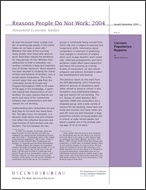Reasons People Do Not Work: 2004
Reasons People Do Not Work: 2004
At even the busiest times, a large number of working-age people in the United States do not have or want jobs.1 Whatever the state of the economy, many people, even those who want to work, have been outside the workforce for long periods of time. Whether their joblessness is brief or extended, nonworkers constitute a large and important pool of human resources.2 Much research has been devoted to studying the characteristics and behavior of workers. Less is known about nonworkers. This is the second report that uses data from the nationwide Survey of Income and Program Participation (SIPP) to fill some of the gaps in this knowledge. It examines several key characteristics of nonworkers, the main reasons they do not work, and some of the connections between their characteristics and their reasons for not working.
Understanding who nonworkers are and why they do not work has many benefits. The labor force, for example, is a dynamic body whose size and composition reflect the collective decisions and opportunities of both workers and nonworkers. The line between the two groups is continually being crossed from either side and is subject to seasonal and longer-term shifts. Information about nonworkers is important in predicting how changes in conditions of employment, such as pay, benefits, work schedules, child-care arrangements, and transportation, might affect these transitions, and hence the economy as a whole. Studies of nonworkers can also inform programs and policies intended to alleviate unemployment and poverty.
_______________
1 In 2005, for example, on average, about one-third of people 16 years old and over were not employed. See annual-average employment percentages from Table 1, “Employment status of the civilian noninstitutional population, 1940 to date,” from U.S. Bureau of Labor Statistics (BLS), Employment and Earnings, at <www.bls.gov/cps/home.htm#annual>.
2 Broadly defined, the category of nonworkers includes all people of working age (usually 15 or 16 years of age or older) who do not have or do not want a job (for pay or profit) in a particular time period. People such as homemakers, retirees, and full-time students are often, but not necessarily, members of the group. For the specific definition of nonworkers used in this report, see Footnote 8.
Others in Series
Publication
Publication
Publication




